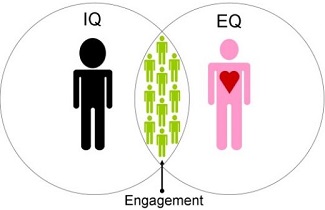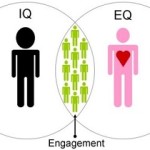 For years we’ve known of and used intelligence quotient, or IQ as the measure of ones mental abilities. In the recent years there is a new factor that promises to more accurately predict person’s success in life and business. It is called emotional intelligence but is it really all that it promises to be. Here is how Wikipedia.org describes it:
For years we’ve known of and used intelligence quotient, or IQ as the measure of ones mental abilities. In the recent years there is a new factor that promises to more accurately predict person’s success in life and business. It is called emotional intelligence but is it really all that it promises to be. Here is how Wikipedia.org describes it:
Emotional intelligence (EI) is the ability to identify, assess, and control the emotions of oneself, of others, and of groups.
Now, I did a course recently that basically settles the argument whether EI is or isn’t important in the workplace. It basically says that once IQ threshold that a person is normal is reached, IQ only remains 4 to 25% important in determining ones success in their career and EI takes over as main factor in job success – but how?
Personal abilities
In order to be successful around other people you would have to work on your own personal abilities first. These include
- self-awareness – your emotions, strengths, abilities and limitations and
- self-management – involves controlling your emotions and impulses, having integrity, being responsible, innovative and proactive
- goal orientation – ability to reach a goal, be motivated and possess positive attitude to reach that goal.
Social abilities
- Empathy – taking interest and helping in other people’s needs. Example of this is taking active interest in customer’s concerns
- Social skills – socialite effective response from others and leadership skills. Have an ability to work well in a team, lead effectively and influence others.
Gut instinct and intuition
Every experience you have evokes an emotion, fear, happiness or contentment. Particular part of the brain controlling this in humans is called amygdala – it acts as a radar to tell us if something is wrong or not. Amygdala uses this information to make a decision based on what’s commonly known as ‘gut feeling’. It is a fine art to balance feelings with facts.
Avoid blind spots
Definition of blind spots is to stifle or make inaccurate self-understanding and self-assessment. Here are a few examples of blind spots:
- Excessive ambition – person competes and doesn’t cooperate, brags about his or her accomplishments
- Unreasonable goals and lack of sympathy when team members struggle
- Workaholic – long hours can cause inability to cope effectively during emergency situations
- Micro-management – pressing and telling others what to do
- Hunger for power – an authority to further his/her own interests and not others needs
- Glory seeking – someone who takes credit for others work and once praised they’re looking for next parade
- Focus on appearance – someone worried about their looks rather then the employees
- Perfectionist – focused on small details. Also doesn’t take feedback well (who does!) and often becomes angry and never admits mistakes even when at fault.
Lack of Confidence
People lacking confidence don’t trust their own judgement and if someone disagrees, they give up easily. They rely on the opinion of others even if their opinion is of better evidence, they avoid small risks and possess no self assurance to bounce back from mistakes so they avoid anything outside their safety zones.
Act with courage
If the risk of not speaking out is greater than the risk of speaking out, go over your bosses head if that’s what it takes to avoid disaster – stick to your view and decisions and recommendations, don’t cave in.
Self-control
Control (not block) your emotions and impulses, there is nothing wrong in having bad emotions, it is how you deal with them and turn them into positives. Manage your moods, remain neutral and calm under attack. (Plan ahead, reherse a meeting with someone who makes you emotional; Count to 10 before you speak, think before you say something; Ask for help, ask someone to check your work before submiting to get better). Think of the consequences before you act (impulse control). Be reliable.
Integrity and honesty
Be frank, admit a mistake and never hesitate to ask for help; build trust and follow through.
Adaptability
To succeed and survive you must change with environment’s changes; be adaptive or you will fall behind. Change to change, innovate and be creative. To be innovative you will seek information, research, talk to customers and figure out their needs – no idea is bizarre, brainstorm! Crazy ideas today are lucrative products tomorrow.
Risk
Take calculated risk. What is calculated risk? It is when you way potential risk and weigh them against rewards to be able to make the final decision.


